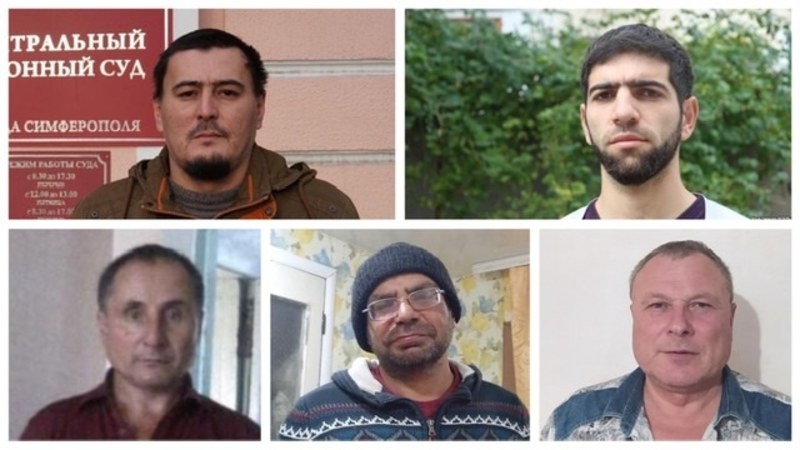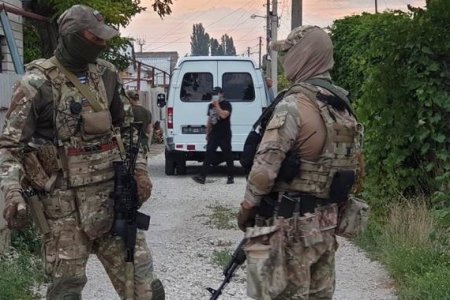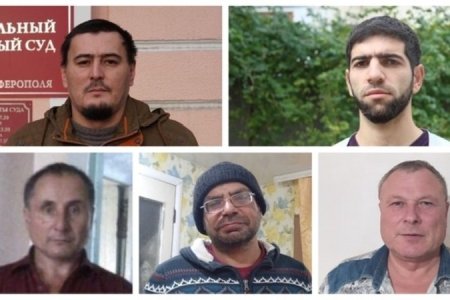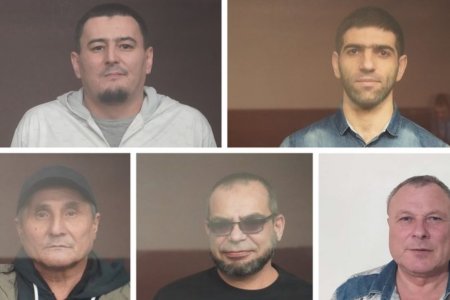
Russia has been fabricating fake ‘terrorism’ charges against Crimean Tatars since soon after its invasion and annexation of Crimea, with the aims always political. The ‘trial’ now underway, however, of five Crimean Tatars from northern Crimea is directly linked with Russia’s war of aggression against Ukraine, with the men seized immediately after a devastating attack on a Russian military base in Crimea that Moscow tried to deny. Emil Kurbedinov, lawyer of one of the men arrested on 12 August 2022, points out that the Russian FSB and state-controlled media claimed that the armed raids and arrests of a Crimean Solidarity journalist and five other Crimean Tatar civic activists had “eliminated a terrorist cell controlled from Ukraine”. This is an especially cynical lie given that the only ‘evidence’ against the men is a conversation illicitly taped in a mosque eight years ago, and totally unverifiable ‘testimony’ from at least one secret witness.
There were huge explosions at the Saki air base on the Black Sea on 10 August 2022. Although the Russian defence ministry claimed that this had merely been an explosion of some munitions, satellite images showed that the likely Ukrainian strike had destroyed seven Russian military planes and damaged others. Less than two days later, armed Russian enforcement officers burst into the homes of six Crimean Tatar families in Dzhankoi and the surrounding area. There was nothing new in Russia’s illegal refusal to allow lawyers to be present at the supposed ‘searches’ during which the officers claim to find ‘prohibited religious literature’ that they, in fact, brought with them. This time, however, the FSB went a step further with Kurbedinov and several other lawyers having their telephone connection cut.
It is just possible that the only link with the attack on the military base was in the propaganda narrative used to report the arrests. Russia’s FSB began arresting Crimean Tatars and, very occasionally, other Ukrainian Muslims, back in 2015 and have, since 2017 been using them as a weapon to try to crush Crimean Solidarity and against Crimean Tatars in general. There is also a mercenary motive since the FSB are known to get bonuses or promotion for such prosecutions which require virtually no work, and are effectively never questioned by ‘judges’ from Russia’s Southern District Military Court in Rostov. A flawed, and almost certainly politically motivated, Russian Supreme Court ruling from 2003 declaring the peaceful transnational Muslim organization Hizb ut-Tahrir ‘terrorist’ is used to sentence men who are not accused of any actual crime to terms of imprisonment up to 25 years. In violation of international law, Russia has been using this as an excuse for arresting Crimean Tatars, especially civic journalists and activists, since 2015. The situation is especially shocking given that Hizb ut-Tahrir is legal in Ukraine (and most other countries). The FSB invariably designates at least one person as ‘organizer’ of a supposed Hizb ut-Tahrir group under Article 205.5 § 1 of Russia’s criminal code. The others are accused of ‘involvement’ in such a fictitious ‘group’ (Article 205.5 § 2). In occupied Crimea, Russia also adds an extra, preposterous, charge of ‘planning to violently seize power’, under Article 278.
Six Crimean Tatars were arrested that day and remanded in custody. Seitiaha Abbozov (b. 1957); Rinat Aliev (b. 1964); Edem Bekirov (b. 1976); Enver Krosh (b. 1991); Crimean Solidarity civic journalist Vilen Temerianov (b. 1985) and the youngest of the men, Murat Mustafayev, who was 27.
In April 2023, it was learned that Murat Mustafayev had been sentenced to four years’ imprisonment for supposed involvement in Hizb ut-Tahrir. This was by the far the quickest ‘trial’ to date and the shortest sentence on ‘Hizb ut-Tahrir’ charges against a Ukrainian citizen in occupied Crimea. The official reason for a sentence much lower than those normally passed was that Mustafayev was said to have “admitted guilt” (details here).
Seitiaha Abbozov was, at least, placed under house arrest, however the other four men were first imprisoned in occupied Crimea, and now in a SIZO [remand prison] in Rostov. Their ‘trial’ is underway at the Southern District Military Court, which has been notorious for passing huge sentences against internationally recognized Ukrainian political prisoners since soon after Russia’s annexation of Crimea. Enver Krosh is accused of being the ‘organizer’, with the sentences currently handed down ranging from 17 to 20 years. . Seitiaha Abbozov; Rinat Aliev; Edem Bekirov and Vilen Temerianov are charged with ‘involvement’, and face sentences of from 12 to 16 years. All of these sentences are in the worst of Russia’s penal institutions. Not one of the men has been accused of any recognizable crime, unlike the convicted murderers and similar who have been released and pardoned for agreeing to fight Russia’s war against Ukraine.
Russia is claiming that ‘terrorism’ charges and such horrific sentences are justified because of a conversation on religious subjects and about Russia’s persecution of Muslims at a mosque in 2015. It was the FSB who organized such illicit recordings, meaning that they then sat on this tape for eight years before staging armed raids on family homes and claiming that they had “eliminated a terrorist cell”.
Kurbedinov has commented on the questioning still underway of the first ‘secret witness’ whose identity is concealed despite the lack of any evidence that the person would be in danger if he testified under his own name. Russia’s use of such anonymous witnesses has been condemned by the UN Secretary General and found by the European Court of Human Rights (in a different case) to violate the men’s right to a fair trial. All of this is ignored and here, as in other cases, the court prevented Kurbedinov from asking this alleged ‘witness’ if he had received any threats that might warrant such secrecy. Such behaviour, demonstrating clear collaboration between judges and the prosecution, were also condemned in the same UN report. In fact, Kurbedinov believes that the same alleged ‘secret witnesses’ have been essentially churning out the same prosecution-dictated line in different trials since 2015. These are not witnesses, he stresses, but agents for the security service. It is therefore all the more disturbing that the courts invariably reject all questions demonstrating that such alleged ‘witnesses’ can repeat allegations that closely correspond to the indictment, while often having ‘memory lapses’ when it comes to the most obvious of questions regarding the account they provide.



